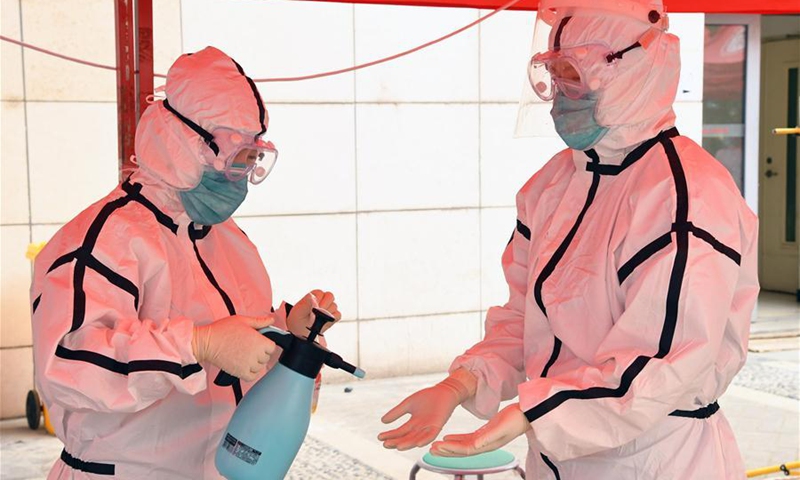UPDATE: Urumqi in Xinjiang vows to conduct mass testing as city fights COVID-19 resurgence
Source: Global Times Published: 2020/7/18 17:55:56 Last Updated: 2020/7/18 21:07:17
Urumqi, the regional capital of Northwest China's Xinjiang Uygur Autonomous Region, with 3.5 million residents, vows to accelerate nucleic acid testing in the entire city, with local hospitals fully deploying testing capabilities in recent days as reported by media on Saturday.
The National Health Commission dispatched 10 medical teams including over 200 members from 10 provinces and municipalities to help carry out nucleic acid testing in Urumqi. Free testing has been carried out in groups in the city, authorities said on Saturday.
One local hospital has been conducting nucleic acid testing on over 8,000 residents per day, according to media reports.
The city plans to carry out nucleic acid testing in communities with key populations such as confirmed and suspected cases, asymptomatic infections, close contacts, and patients with fever starting from Friday. The next step will be to ask other communities and employees from certain companies to undergo the tests.
Urumqi has declared a "wartime mode" as all local residential communities have been put under "sealed-off management" in its fight against the resurgence of COVID-19, local authorities announced during a press conference held on Saturday afternoon.
Numbers of waves of coronavirus cases are commonplace and "subject to the rules of the virus," Yang Zhanqiu, deputy director of the pathogen biology department at Wuhan University, told the Global Times on Saturday.
Yang also called on the public not to panic. "It's impossible to remain at zero cases for long," Yang noted.
Urumqi launched an emergency response plan and set up 15 special groups for anti-epidemic actions, according to the local authorities.
The National Health Commission dispatched 10 medical teams including over 200 members from 10 provinces and municipalities to help carry out nucleic acid testing in Urumqi. Free testing has been carried out in groups in the city, authorities said on Saturday.
One local hospital has been conducting nucleic acid testing on over 8,000 residents per day, according to media reports.
The city plans to carry out nucleic acid testing in communities with key populations such as confirmed and suspected cases, asymptomatic infections, close contacts, and patients with fever starting from Friday. The next step will be to ask other communities and employees from certain companies to undergo the tests.
Urumqi has declared a "wartime mode" as all local residential communities have been put under "sealed-off management" in its fight against the resurgence of COVID-19, local authorities announced during a press conference held on Saturday afternoon.
Numbers of waves of coronavirus cases are commonplace and "subject to the rules of the virus," Yang Zhanqiu, deputy director of the pathogen biology department at Wuhan University, told the Global Times on Saturday.
Yang also called on the public not to panic. "It's impossible to remain at zero cases for long," Yang noted.
Urumqi launched an emergency response plan and set up 15 special groups for anti-epidemic actions, according to the local authorities.

Photo: Xinhua
Several major measures are being strictly implemented in the city. These include carrying out comprehensive epidemiological investigations and disinfection in key areas, and eliminating the source of viral infection; treating patients with all-out efforts; entering a "state of wartime" and stopping group gatherings, implementing "sealed-off management" for residential communities; discouraging local residents from going outside of Urumqi unless necessary; those who need to leave are requested to undergo nucleic acid testing and authorities are to launch testing in the entire city of Urumqi.
Instead of implementing full lockdowns and curbing work and production resumption, Yang addressed two key measures.
"Tracing the origin and infection routes of the disease is the priority," Yang said, noting that it's significant to "isolate key groups" including patients suspected of and confirmed to have been infected with the coronavirus in a timely manner.
From midnight Wednesday to midday Saturday, Urumqi reported 17 confirmed COVID-19 patients, and 23 asymptomatic cases, according to local authorities. The current outbreak is related to a group gathering which is developing rapidly, and local health authorities have advised people not to panic as all the confirmed cases have mild to moderate symptoms, who are also under centralized medical observation.
The Urumqi health authority has reported to the National Health Commission to coordinate the sequencing and analysis of the coronavirus genes, in order to further understand the origin and transmission routes of the virus, Rui Baoling, director of the disease control and prevention center in Urumqi, said at Saturday's press conference.
Global Times
Posted in: SOCIETY